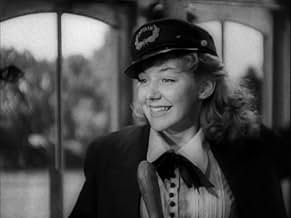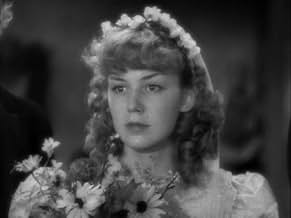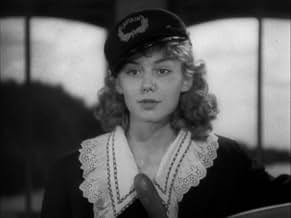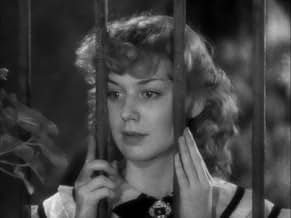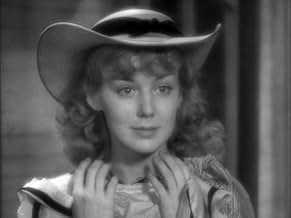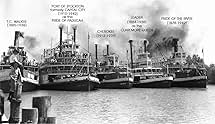NOTE IMDb
6,9/10
1,4 k
MA NOTE
Un escroc en Louisiane engage son steamer dans une course le tout pour le tout avec un rival tout en essayant de trouver un témoin pour libérer son neveu sur le point d'être pendu pour meurt... Tout lireUn escroc en Louisiane engage son steamer dans une course le tout pour le tout avec un rival tout en essayant de trouver un témoin pour libérer son neveu sur le point d'être pendu pour meurtre.Un escroc en Louisiane engage son steamer dans une course le tout pour le tout avec un rival tout en essayant de trouver un témoin pour libérer son neveu sur le point d'être pendu pour meurtre.
- Réalisation
- Scénario
- Casting principal
- Récompenses
- 3 victoires au total
C.E. Anderson
- Jailer
- (non crédité)
Sam Baker
- Undetermined Role
- (non crédité)
William 'Billy' Benedict
- Breck
- (non crédité)
Heinie Conklin
- Jailbird
- (non crédité)
Tex Cooper
- Townsman
- (non crédité)
D'Arcy Corrigan
- Hangman
- (non crédité)
Luke Cosgrave
- Labor Boss
- (non crédité)
Avis à la une
Endings are important, and even in light comedies with adventure undertones, those endings end up helping to shape everything that came before it. I was a bit flustered by the first hour or so of John Ford's Steamboat Round the Bend, finding things to like but frustrated at the extraordinary loose nature of the telling, but the ending brought everything together in rip-roaring fashion. Will Rogers' final filmed role before his airplane crash that killed him ends up being a fancifully entertaining trip down the Mississippi.
Rogers plays Doctor John Pearly, a conman selling a tonic he says comes from a recipe by Pocahontas herself, but which is literally just rum, to people on the river as he makes his way up to find his own dilapidated riverboat, ready for him to refurbish and put back on the water. When he first arrives at his new home on the river his nephew Duke (John McGuire) arrives with a swamp woman in tow, Fleety Belle (Anne Shirley). Duke had killed Belle's father in an act of self-defense after they had been seeing each other secretly for some time, but the only witness to the events that could possibly clear his name is New Moses (Berton Churchill), a bearded temperance preacher who travels up and down the river, converting wayward souls. However, before anyone can find New Moses, the law arrests Duke, and John forces Belle's family away by lying and saying that Duke and Belle have married.
This was a strong start, and then the movie just kind of begins to flounder for a while. John takes Belle on his refurbished boat up and down the river nominally looking for Old Moses, but they take on a traveling museum of sorts, filling the hold with mannequins of famous historical figures with a lot of talk about how to Americanize the figures to help attract customers. Some small adventures, misunderstandings, and scrapes dominate the middle section of this film around the museum, and while most of it is very lightly amusing, it feels like the movie itself has gotten lost. There's suddenly no urgency about Duke or his plight. It's kind of odd.
After a brief marriage ceremony to make John's lie of Belle and Duke a reality, Duke gets taken down to Baton Rouge for execution. John ends up chasing after Duke and gets caught up in a riverboat race, forced to join as the only way to go further south on the Mississippi and developing a rivalry with Captain Eli (Irvin S. Cobb), pilot of another steamboat. It's here where the movie reclaims its focus and, more entertainingly, a strong sense of energy as the film becomes a race against the clock on two different fronts, the literal race against the other steamboats and the need to get to Baton Rouge before Duke's execution. They may not have much more of a plan than that, but they have to go. In swift order, though, they encounter New Moses preaching on the side of the river, rope him in (literally), and speed off, burning more and more of the riverboat's ephemera to fuel the engines from the lifeboats to, as the race becomes more desperate, the mannequins themselves. Watching New Moses in all of this is a treat, and when he discovers that John has a supply of the Pocahontas cure all on board, also that it's just rum, he has the idea of throwing them in to heat the engine and propel them faster. It's kind of wild stuff, and it's a very fun comedic crescendo for the whole picture.
The film was apparently cut down by about twenty minutes after Will Rogers' death, mostly in the ending, forcing a final shot of Rogers as John reclining on the deck of his boat. It's a nice moment for the character as well as the actor.
This is the first time that Rogers worked with Ford where it felt like Rogers was actually playing a character instead of just himself, and it's a nice change of pace. He doesn't dominate the film like he does in the other two films (Doctor Bull and Judge Priest) to varying degrees of success, allowing the story to play through without completely overrunning everything else. He's the central character for sure, but he allows space for Annie Shirley, as his primary counterpart, to shine in bright and cheerful fashion.
It really could have used a rewrite in its middle section, a section that dragged the film down a good bit, but that ending is really something else, a madcap race with real stakes and cut quickly for an all around good time. It really won me over by the end.
Rogers plays Doctor John Pearly, a conman selling a tonic he says comes from a recipe by Pocahontas herself, but which is literally just rum, to people on the river as he makes his way up to find his own dilapidated riverboat, ready for him to refurbish and put back on the water. When he first arrives at his new home on the river his nephew Duke (John McGuire) arrives with a swamp woman in tow, Fleety Belle (Anne Shirley). Duke had killed Belle's father in an act of self-defense after they had been seeing each other secretly for some time, but the only witness to the events that could possibly clear his name is New Moses (Berton Churchill), a bearded temperance preacher who travels up and down the river, converting wayward souls. However, before anyone can find New Moses, the law arrests Duke, and John forces Belle's family away by lying and saying that Duke and Belle have married.
This was a strong start, and then the movie just kind of begins to flounder for a while. John takes Belle on his refurbished boat up and down the river nominally looking for Old Moses, but they take on a traveling museum of sorts, filling the hold with mannequins of famous historical figures with a lot of talk about how to Americanize the figures to help attract customers. Some small adventures, misunderstandings, and scrapes dominate the middle section of this film around the museum, and while most of it is very lightly amusing, it feels like the movie itself has gotten lost. There's suddenly no urgency about Duke or his plight. It's kind of odd.
After a brief marriage ceremony to make John's lie of Belle and Duke a reality, Duke gets taken down to Baton Rouge for execution. John ends up chasing after Duke and gets caught up in a riverboat race, forced to join as the only way to go further south on the Mississippi and developing a rivalry with Captain Eli (Irvin S. Cobb), pilot of another steamboat. It's here where the movie reclaims its focus and, more entertainingly, a strong sense of energy as the film becomes a race against the clock on two different fronts, the literal race against the other steamboats and the need to get to Baton Rouge before Duke's execution. They may not have much more of a plan than that, but they have to go. In swift order, though, they encounter New Moses preaching on the side of the river, rope him in (literally), and speed off, burning more and more of the riverboat's ephemera to fuel the engines from the lifeboats to, as the race becomes more desperate, the mannequins themselves. Watching New Moses in all of this is a treat, and when he discovers that John has a supply of the Pocahontas cure all on board, also that it's just rum, he has the idea of throwing them in to heat the engine and propel them faster. It's kind of wild stuff, and it's a very fun comedic crescendo for the whole picture.
The film was apparently cut down by about twenty minutes after Will Rogers' death, mostly in the ending, forcing a final shot of Rogers as John reclining on the deck of his boat. It's a nice moment for the character as well as the actor.
This is the first time that Rogers worked with Ford where it felt like Rogers was actually playing a character instead of just himself, and it's a nice change of pace. He doesn't dominate the film like he does in the other two films (Doctor Bull and Judge Priest) to varying degrees of success, allowing the story to play through without completely overrunning everything else. He's the central character for sure, but he allows space for Annie Shirley, as his primary counterpart, to shine in bright and cheerful fashion.
It really could have used a rewrite in its middle section, a section that dragged the film down a good bit, but that ending is really something else, a madcap race with real stakes and cut quickly for an all around good time. It really won me over by the end.
Steamboat Round the Bend is one of 3 collaborations between director John Ford and actor Will Rogers, and was shot in 6 weeks in the Sacramento River Delta.
The commentary by Scott Eyman, on the 2006 DVD, is worth having apart from the film. Eyman is author of two books on director John Ford: Print the Legend, and John Ford: The Complete Films. His commentary is among the very best I have ever heard.
Standout scenes: An exquisite wedding ceremony brings tears even to Will Rogers's eyes, and he is not acting. Anne Shirley as Fleety Belle is stunning in her delicate beauty throughout. The "New Moses," Berton Churchill, is memorable in his role as a full-of-himself blowhard, as he was playing the prosecuting attorney in the 1934 "Judge Priest," another Ford-Rogers collaboration. Another reprise from Judge Priest is John Ford's brother Francis, again playing a drunk with amazing aim when he spits. A final highlight is supercharging the Claremore Queen firebox with the Pocahontas Remedy.
Some viewers are disturbed by Lincoln Perry's (Stepin Fetchit) character, but more disturbing to me was the lassoing of Moses! Scott Eyman gives a superb analysis of the dull and slow character played by Stepin Fetchittranscending the kneejerk politically-correct reaction of today, and placing Fetchit's characterization (and that of Hattie McDaniel in other films) in a larger context. He says "might I offer a modest proposal: Is it not now time to look past the stereotypes these actors portrayed-- and look at the art, and the warmth, with which they played them." Two other films with Rogers have the same charm and image of 19th Century American values; one is the Ford Rogers collaboration Judge Priest, and the other, also released in 1935, is In Old Kentucky.
Commentator Eyman says "taken together, the 3 Ford-Rogers films (Judge Priest, Dr. Boles, and Steamboat) rank with Ford's finest achievements." After Rogers's tragic death, 50,000 people filed by his closed casket, and 12,000 movie theaters went dark for two minutes.
The commentary by Scott Eyman, on the 2006 DVD, is worth having apart from the film. Eyman is author of two books on director John Ford: Print the Legend, and John Ford: The Complete Films. His commentary is among the very best I have ever heard.
Standout scenes: An exquisite wedding ceremony brings tears even to Will Rogers's eyes, and he is not acting. Anne Shirley as Fleety Belle is stunning in her delicate beauty throughout. The "New Moses," Berton Churchill, is memorable in his role as a full-of-himself blowhard, as he was playing the prosecuting attorney in the 1934 "Judge Priest," another Ford-Rogers collaboration. Another reprise from Judge Priest is John Ford's brother Francis, again playing a drunk with amazing aim when he spits. A final highlight is supercharging the Claremore Queen firebox with the Pocahontas Remedy.
Some viewers are disturbed by Lincoln Perry's (Stepin Fetchit) character, but more disturbing to me was the lassoing of Moses! Scott Eyman gives a superb analysis of the dull and slow character played by Stepin Fetchittranscending the kneejerk politically-correct reaction of today, and placing Fetchit's characterization (and that of Hattie McDaniel in other films) in a larger context. He says "might I offer a modest proposal: Is it not now time to look past the stereotypes these actors portrayed-- and look at the art, and the warmth, with which they played them." Two other films with Rogers have the same charm and image of 19th Century American values; one is the Ford Rogers collaboration Judge Priest, and the other, also released in 1935, is In Old Kentucky.
Commentator Eyman says "taken together, the 3 Ford-Rogers films (Judge Priest, Dr. Boles, and Steamboat) rank with Ford's finest achievements." After Rogers's tragic death, 50,000 people filed by his closed casket, and 12,000 movie theaters went dark for two minutes.
This movie was shown recently as part of a major comedy retrospective at Film Forum in New York, but it seemed somewhat out of place alongside the likes of the Marx Brothers and Mae West. Steamboat Round the Bend is an interesting and unusual film with occasional comic touches, but it's primarily a serious tale with elements of melodrama. The story is set in the 1890s, and rich period atmosphere is one of the film's strongest assets. Although it's not based on a Mark Twain story director John Ford captures that Old Times on the Mississippi flavor better than a lot of movies based on Twain's books. Ultimately, this is a rich slice of Americana with a distinct Southern bias. That's all well and good if you have an interest in American history as depicted in Hollywood films of this period, but viewers expecting non-stop laughs will be disappointed. Those of us who grew up watching TV in the '60s might find that Steamboat Round the Bend is reminiscent of The Andy Griffith Show: it has the same relaxed tempo, presents a similarly benign view of Southern life (with the stark exception of one sequence, which I'll discuss in a moment), and has as its leading man a very low-key guy.
Here, as in his other talkies, Will Rogers ambles through the proceedings in a seemingly casual fashion. He was unlike any other star of his time -- or since, really -- and viewers who've never seen one of his movies might find him a little odd at first. Like his friend W.C. Fields, Rogers refused to rehearse his scenes and insisted on doing a minimal number of takes, even if he fluffed his lines, which he often did. His acting is so offhand, and so unlike the polished Hollywood performance style of his day, a first-time viewer might mistake him for an amateur who somehow wandered onto the set. Once you adjust to his naturalistic style, however, Rogers' special talent becomes obvious, and it's the other actors who start looking theatrical and phony. Aside from the lead the most memorable performances in this film are given by the growly-voiced Eugene Palette, who gets most of the laughs, and bright-eyed Anne Shirley, who holds her own with Rogers in their scenes together.
Steamboat Round the Bend is probably best remembered as Will Rogers' swan song, the last project he finished before his death in a plane crash, but like much of his work it never had a legitimate video release in the VHS era, most likely because of the presence of the notorious African-American comedian Stepin Fetchit. When several Rogers movies were released on video a few years back the ones featuring Fetchit were skipped, probably because modern day audiences are uncomfortable with the his "comedy relief," and for good reason: watching Stepin Fetchit can be very discomfiting. Anyone who seeks proof of Hollywood racism need look no further than films of the '30s in which he was featured. For those who haven't seen him, it might help to explain that despite the sound of his name and what it implies, Stepin Fetchit was Hollywood's favorite lazy simpleton, a woozy scamp with a slow-as-molasses delivery that's difficult to decipher. He comes off as heavily sedated, or even mentally retarded. Who could laugh at this sort of thing today? In recent years a few film critics and historians (including some African-American ones) have taken a more sympathetic view of Fetchit's career, and have made positive assertions about what he was able to accomplish within the confines of the demeaning roles he was given. Well, whatever. Where this movie is concerned I'll note simply that Fetchit's screen time is mercifully limited, and that the film has only a minimal amount of racial humor. In fact, about halfway through there is a remarkable sequence in which attitudes of the Old South are satirized in a surprising fashion.
To set the scene: Rogers (playing Dr. John), with the help of Anne Shirley (Fleety Belle) is attempting to raise money to pay legal fees to save his nephew from the gallows. They are sailing up and down the Mississippi in his old steamboat with a small crew (including Fetchit as Jonah), carrying what's left of the dummies from a defunct wax museum, charging riverfront locals to come look at the statues. When they reach one particular backwoods village, a mob of men advance carrying torches, pitchforks, axes, and a vat of tar, determined to destroy the boat and punish the wicked theater folk who have brought sinful playacting to their community. Dr. John is slow to recognize the danger, so much so that our credulity is strained, but it's striking to note that Jonah appreciates the danger instantly: he knows a lynch mob when he sees one. Dr. John is eventually able to pacify the mob when he invites the men onto his boat, and convinces them that the wax figures are "educational." This impressive word plus the sight of the dummies in their tatty costumes reduces the locals to a state of slack-jawed submission. The punchline comes when Dr. John gives the signal to raise a curtain, revealing a moth-eaten statue of Robert E. Lee astride his horse. At another command, the figure salutes stiffly, and the now-awed rednecks salute in return. For the finale, Jonah, sitting at the calliope, plays "Dixie" and sings along raggedly in a screechy, off-key voice as the scene fades out. It's a startling sequence, bitingly satirical in a way we don't expect, and perhaps not in the way the filmmakers intended. At any rate, this film is well worth a look for viewers who are historically-minded, curious about Will Rogers, or interested in the mass media's presentation of race relations.
P.S. Summer 2006: I'm pleased to add that this film is now available on DVD, in a box-set with three other movies Will Rogers made during the last year of his life.
Here, as in his other talkies, Will Rogers ambles through the proceedings in a seemingly casual fashion. He was unlike any other star of his time -- or since, really -- and viewers who've never seen one of his movies might find him a little odd at first. Like his friend W.C. Fields, Rogers refused to rehearse his scenes and insisted on doing a minimal number of takes, even if he fluffed his lines, which he often did. His acting is so offhand, and so unlike the polished Hollywood performance style of his day, a first-time viewer might mistake him for an amateur who somehow wandered onto the set. Once you adjust to his naturalistic style, however, Rogers' special talent becomes obvious, and it's the other actors who start looking theatrical and phony. Aside from the lead the most memorable performances in this film are given by the growly-voiced Eugene Palette, who gets most of the laughs, and bright-eyed Anne Shirley, who holds her own with Rogers in their scenes together.
Steamboat Round the Bend is probably best remembered as Will Rogers' swan song, the last project he finished before his death in a plane crash, but like much of his work it never had a legitimate video release in the VHS era, most likely because of the presence of the notorious African-American comedian Stepin Fetchit. When several Rogers movies were released on video a few years back the ones featuring Fetchit were skipped, probably because modern day audiences are uncomfortable with the his "comedy relief," and for good reason: watching Stepin Fetchit can be very discomfiting. Anyone who seeks proof of Hollywood racism need look no further than films of the '30s in which he was featured. For those who haven't seen him, it might help to explain that despite the sound of his name and what it implies, Stepin Fetchit was Hollywood's favorite lazy simpleton, a woozy scamp with a slow-as-molasses delivery that's difficult to decipher. He comes off as heavily sedated, or even mentally retarded. Who could laugh at this sort of thing today? In recent years a few film critics and historians (including some African-American ones) have taken a more sympathetic view of Fetchit's career, and have made positive assertions about what he was able to accomplish within the confines of the demeaning roles he was given. Well, whatever. Where this movie is concerned I'll note simply that Fetchit's screen time is mercifully limited, and that the film has only a minimal amount of racial humor. In fact, about halfway through there is a remarkable sequence in which attitudes of the Old South are satirized in a surprising fashion.
To set the scene: Rogers (playing Dr. John), with the help of Anne Shirley (Fleety Belle) is attempting to raise money to pay legal fees to save his nephew from the gallows. They are sailing up and down the Mississippi in his old steamboat with a small crew (including Fetchit as Jonah), carrying what's left of the dummies from a defunct wax museum, charging riverfront locals to come look at the statues. When they reach one particular backwoods village, a mob of men advance carrying torches, pitchforks, axes, and a vat of tar, determined to destroy the boat and punish the wicked theater folk who have brought sinful playacting to their community. Dr. John is slow to recognize the danger, so much so that our credulity is strained, but it's striking to note that Jonah appreciates the danger instantly: he knows a lynch mob when he sees one. Dr. John is eventually able to pacify the mob when he invites the men onto his boat, and convinces them that the wax figures are "educational." This impressive word plus the sight of the dummies in their tatty costumes reduces the locals to a state of slack-jawed submission. The punchline comes when Dr. John gives the signal to raise a curtain, revealing a moth-eaten statue of Robert E. Lee astride his horse. At another command, the figure salutes stiffly, and the now-awed rednecks salute in return. For the finale, Jonah, sitting at the calliope, plays "Dixie" and sings along raggedly in a screechy, off-key voice as the scene fades out. It's a startling sequence, bitingly satirical in a way we don't expect, and perhaps not in the way the filmmakers intended. At any rate, this film is well worth a look for viewers who are historically-minded, curious about Will Rogers, or interested in the mass media's presentation of race relations.
P.S. Summer 2006: I'm pleased to add that this film is now available on DVD, in a box-set with three other movies Will Rogers made during the last year of his life.
This film debuted just after Will Rogers was tragically killed in a plane crash. Because of this, "Steamboat Round The Bend" is one of the last chances anyone had to see him in film. While it's not among his best films, it's pretty good and well worth seeing.
Rogers plays a 'snake oil' salesman (a guy who sells fake cure-all medicines) has been saving for some time to buy a dilapidated old steamboat. His plan is to run it with his nephew, Duke. However, when Duke arrives, he tells his Uncle that he's just killed a man in self-defense and has brought a woman from the swamps with him. Uncharacteristically, Rogers' character is nasty and voices a strong prejudice against swamp people (no, not the comic book character but people who live in the swamplands). Considering what a nice guy he was in his other films AND his famous quote ("I never met a man I didn't like"), this prejudiced attitude DID seem pretty strange--as did his playing a bit of a swindler.
Fortunately, his character DID improve as the film progressed. Later, instead of hating this girl (Anne Shirley), he felt sorry for her and cared for her when her beloved was jailed for this killing. However, what is Rogers to do--as the Nephew is due to be hung AND he's made a bet to beat a rival captain in the big race? tune in and see for yourself in this gentle slice of Americana.
As I said above, Rogers' character wasn't nearly as sweet as he'd been in other movies. But he was likable enough AND the rest of the cast did a good job--as too often in the past the film was all on Rogers' shoulders--here it's a nice ensemble cast. Berton Churchill (in the weirdest role of his career), Eugene Palette and Steppin Fetchit are on hand to provide some nice support--and Fetchit's a little easier to take as his horrible stereotypical act isn't as obvious and offensive as usual. Overall, well worth seeing.
Rogers plays a 'snake oil' salesman (a guy who sells fake cure-all medicines) has been saving for some time to buy a dilapidated old steamboat. His plan is to run it with his nephew, Duke. However, when Duke arrives, he tells his Uncle that he's just killed a man in self-defense and has brought a woman from the swamps with him. Uncharacteristically, Rogers' character is nasty and voices a strong prejudice against swamp people (no, not the comic book character but people who live in the swamplands). Considering what a nice guy he was in his other films AND his famous quote ("I never met a man I didn't like"), this prejudiced attitude DID seem pretty strange--as did his playing a bit of a swindler.
Fortunately, his character DID improve as the film progressed. Later, instead of hating this girl (Anne Shirley), he felt sorry for her and cared for her when her beloved was jailed for this killing. However, what is Rogers to do--as the Nephew is due to be hung AND he's made a bet to beat a rival captain in the big race? tune in and see for yourself in this gentle slice of Americana.
As I said above, Rogers' character wasn't nearly as sweet as he'd been in other movies. But he was likable enough AND the rest of the cast did a good job--as too often in the past the film was all on Rogers' shoulders--here it's a nice ensemble cast. Berton Churchill (in the weirdest role of his career), Eugene Palette and Steppin Fetchit are on hand to provide some nice support--and Fetchit's a little easier to take as his horrible stereotypical act isn't as obvious and offensive as usual. Overall, well worth seeing.
It's funny to think that when this film was made, it was about a time in the early 1890's, only 35 years earlier than it's production. Now we are looking back almost 75 years at the film itself. I expected a light wacky comedy, but there is definitely a well-rounded plot here revolving around murder in self-defense. Will Rogers gives a very skilled and sympathetic performance, but some of the more hilarious gags in this are gifts from the writers.
The sheriff/preacher's wedding speech goes right up there with Donald Sutherland's in "Little Murders" for sheer comic value.
A great throwaway gag involves the search for the New Moses, when they accidentally run into the New Elijah instead!
Steppin Fetchit, while no great symbol for African Americans, actually plays against his lazy type in this, and his hard work and quick thinking actually save the day on a couple occasions.
A great (and uncommon) saw-playing musical interlude!
To me, the only major weakness was Ms. Shirley as the ingenue. She was quite likable, but did not seem to have lived as hard as her character was supposed to have.
All told, a winner of a film for fans of the 1930's view of the 1890's.
The sheriff/preacher's wedding speech goes right up there with Donald Sutherland's in "Little Murders" for sheer comic value.
A great throwaway gag involves the search for the New Moses, when they accidentally run into the New Elijah instead!
Steppin Fetchit, while no great symbol for African Americans, actually plays against his lazy type in this, and his hard work and quick thinking actually save the day on a couple occasions.
A great (and uncommon) saw-playing musical interlude!
To me, the only major weakness was Ms. Shirley as the ingenue. She was quite likable, but did not seem to have lived as hard as her character was supposed to have.
All told, a winner of a film for fans of the 1930's view of the 1890's.
Le saviez-vous
- AnecdotesThe film was released shortly after Will Rogers' death on 15 August 1935 from an airplane crash near Point Barrow, Alaska with noted aviator Wiley Post. Originally, the ending of the film had him waving goodbye to the character played by Irvin S. Cobb, but the ending was changed to avoid the audience thinking he was saying goodbye to them, which may have caused them to leave the theater in tears. Cobb urged the ending not be changed. The review which appeared in Variety 25 September 1935 indicated the film had been "announced" as 102 minutes, but had been considerably shortened, which no doubt accounts for some problems in continuity and the abrupt ending.
- GaffesAt the end of the race, an official on a stand is waving a black and white checkered flag. A title card at the beginning of the film states this film is set in the early 1890s. The earliest known use of a checkered flag to signify the end of a race was for the 1906 Vanderbuilt Cup auto race.
- Citations
New Moses: I've got souls to save.
Doctor John Pearly: No, you got a life to save, and the Lord don't care which one of your jobs you do first.
- ConnexionsFeatured in Directed by John Ford (1971)
- Bandes originalesSteamboat Round the Bend
(1935) (uncredited)
Music by Oscar Levant
Lyrics by Sidney Clare
Sung by an unidentified chorus during opening sequence and played during closing credits
Meilleurs choix
Connectez-vous pour évaluer et suivre la liste de favoris afin de recevoir des recommandations personnalisées
- How long is Steamboat Round the Bend?Alimenté par Alexa
Détails
- Date de sortie
- Pays d’origine
- Langue
- Aussi connu sous le nom de
- Steamboat Bill
- Lieux de tournage
- San Joaquin River, Californie, États-Unis(River and Delta at Stockton: steam ships, rivers channels)
- Société de production
- Voir plus de crédits d'entreprise sur IMDbPro
- Durée
- 1h 22min(82 min)
- Couleur
- Rapport de forme
- 1.37 : 1
Contribuer à cette page
Suggérer une modification ou ajouter du contenu manquant

